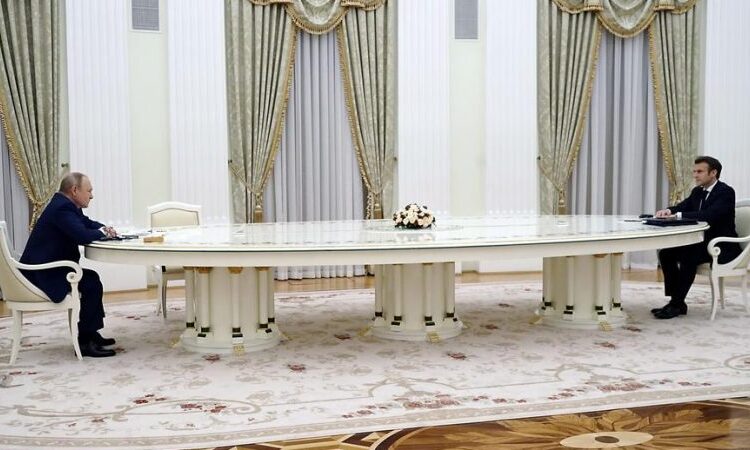Putin’s narratives
Despite diplomatic overtures, Putin used the press opportunity to go on the offensive over his grievances against NATO and Ukraine.
After both leaders sat down for a face-to-face dinner, Putin in Moscow said there would be no winners should European countries be drawn into a military conflict with Russia in the event Ukraine joins NATO and tries to retake Crimea.
He declared that Crimea is Russia, that the power change in Kyiv in 2013 was a coup d’état and that European countries would “automatically” be at war with Russia if Ukraine joined NATO.
In particular, he mentioned that Ukraine officially plans to retake Crimea by military force, which, in his words, would mean if Ukraine joins NATO, there will be war between NATO and Russia.
“Do you want to be at war with Russia? Ask your readers, your viewers, do you want France to be at war with Russia”, Putin told the press.
The Russian president also accused Kyiv of violating the rights of its Russian-speaking population and said that its government is “ignoring all possibilities for a peaceful resolution of the situation in Donbas,” referring to the separatist regions in Ukraine’s east.
Putin also said Russia would keep trying to obtain answers from the West to its main security demands for “ensuring equal security in Europe,” even though he accused the US and NATO of “bypassing” those demands in formal responses sent to Moscow last month.
Washington and NATO have said some of Russia’s demands, including barring Ukraine from ever joining NATO, are “non-starters”, but they are ready to talk to Moscow about arms control and confidence-building measures.
Putin said the Western replies had not addressed Moscow’s three key demands, listing them as no more enlargement of NATO, no missile deployments near Russia’s borders, and a scaling back of NATO’s military infrastructure in Europe to 1997 levels.
“The impression is that we didn’t even raise these questions; they simply bypassed them,” Putin said.
“We see political clichés there and proposals on some secondary issues. I do not think that this is where our dialogue ends – now we will formulate an answer, our vision, and send it to Washington and Brussels,” he added.
With that, the Russian president gave the prospect that the process of dealing with the Russian-proposed security proposals is far from over and could end up in a lengthy back and forth of rebuttals from both sides.
Macron’s proposals
Speaking right after the Russian president declared Crimea is irrevocably part of Russia, Macron failed to address Putin’s claim or some of his other questionable geographical assumptions.
However, the French president did push back on principles of Europe’s security order, saying Europe “can’t accept spheres of influence in Europe”.
Nevertheless, the encounter for some observers revived memories of EU chief diplomat Josep Borrell’s unfortunate visit to Moscow last year, who back then was not able to counterargument Russian Foreign Minister Sergei Lavrov, who had called the EU out to be an “unreliable partner.”
Macron said that he and Putin were able to find “points of convergence” over the crisis and that it was “up to us to agree, jointly, concrete and specific measures to stabilise the situation and to de-escalate tensions.”
“There is still time to preserve peace,” Macron said.
Macron said he made concrete proposals to address the concerns of both Russia and the West.
“President Putin assured me of his readiness to engage,” Macron said, adding: “There is no security for the Europeans if there is no security for Russia.”
The French presidency said the proposals include an undertaking from both sides not to take any new military action, the launching of a new strategic dialogue and efforts to revive the peace process in Kyiv’s conflict with Moscow-backed separatists in the country’s east.
Back to Minsk
Speaking to reporters, Macron made it clear he and German Chancellor Olaf Scholz were continuing efforts for the “full implementation” of the Minsk agreements concerning the regions of Donbas – Donetsk and Lugansk – which pro-Russian separatists currently control.
Brokered by France and Germany, the Minsk agreements of 2014 and 2015 aimed to resolve conflict in the east following Russia’s 2014 annexation of Crimea.
The February 2015 Minsk protocol foresees the withdrawal of all foreign armed formations, military equipment, and mercenaries from the territory of Ukraine under the supervision of the OSCE and disarmament of all illegal groups.
In parallel, it envisages carrying out constitutional reform in Ukraine that provide for decentralisation as a key element and local elections in Donetsk and Luhansk regions in compliance with relevant OSCE standards and monitored by the OSCE/ODIHR.
However, the accord, which is unclear about sequencing, faces the difficulty of reconciling Ukraine’s demand for full sovereignty over its territory with Russia’s insistence that the Russian-speaking people of eastern Ukraine receive autonomy.
Moscow may hope that Macron helps him to fortify the Russian interpretation of the Minsk agreements by setting Kyiv under pressure to advance Russia’s agenda – something Ukraine has warned it is not willing to accept.
Read the full article here

